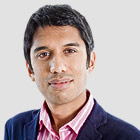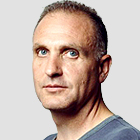'People will forgive you for being wrong, but they will never forgive you for being right - especially if events prove you right while proving them wrong.' Thomas Sowell
Search This Blog
Showing posts with label syllabus. Show all posts
Showing posts with label syllabus. Show all posts
Wednesday, 11 August 2021
Tuesday, 21 February 2017
Study Economics To Win Every Argument
by Girish Menon

The Emperor's new clothes courtesy Cactus Records
Since 1992 when former US President Bill Clinton’s campaign manager coined the winning slogan, ‘It’s the economy, stupid!’ persuaders of all belief systems have been increasingly relying on economic arguments to win the debate. The Brexit vote and Trump’s election are recent examples of the success of an economic point of view to the detriment of all others. A student with a good A level in economics will be equipped to reason out the merits and demerits of each argument and defend her own belief system or prejudice.
The A Level
syllabus
In the book The Econocracy three Manchester University
In a nutshell an A level in economics is divided into two
parts viz. Microeconomics and Macroeconomics. Microeconomics explores the
theoretical utopia of a free market which is known as perfect competition and
compares it with modern market phenomena like Monopoly, Oligopoly and
Monopsony. Macroeconomics looks at the picture from a national point of view
and explores themes like Inequality, Unemployment and Immigration, Economic
Growth and Trade/Budget deficits. It also considers the tradeoffs that
governments face as they try to resolve crises.
Am I suited for an
Economics A Level Course?
Unlike economics courses at most universities which rely on
a strong foundation in mathematics, an A level economics course is right for
any student who has an A grade in Mathematics and English at the GCSE level. He
should have a curiosity about the world he lives in, is able to think logically
and must have a desire to debate issues based on evidence.
In short, an Economics A Level Course can combine well with
the sciences, the arts, the languages as well as the humanities. You could do
this A level especially when you wish to specialise in other subjects at the
degree level.
What will I gain
from doing the Economics A Level Course?
You will realise that there is no such thing as a free
market. You will have heard politicians and other persuaders trying to praise
the virtues of the free market. After doing an A level in Economics, you will
understand the assumptions that underlie free market theory. You will then
conclude that those arguing for a free market are not making objective
arguments but are indulging in alternative facts.
You will realise the bluntness of economic policy tools and
why governments are unable to solve the problems of climate change, rising
inequality, racism and other social ills.
Most importantly, you will understand the meaning of economic
terms. You will discover that many popular ‘economic arguments’ are actually
political arguments couched in economic terms. You will then be able to indulge
in debate in a confident manner and be able to point out loopholes in your
opponents’ arguments.
Many handed person
A businessperson was once asked what kind of economist she
wished to hire. She replied, ‘a one handed economist’. When she was asked to
explain her strange reply, she said, ‘When I ask a question of an economist I
want him to give me a straight reply and not resort to phrases like on the
other hand…’.
Thursday, 9 February 2017
How three students caused a global crisis in economics - A review of The Econocracy
Aditya Chakrabortty in The Guardian
In the autumn of 2011, as the world’s financial system lurched from crash to crisis, the authors of this book began, as undergraduates, to study economics. While their lectures took place at the University of Manchester the eurozone was in flames. The students’ first term would last longer than the Greek government. Banks across the west were still on life support. And David Cameron was imposing on Britons year on year of swingeing spending cuts.
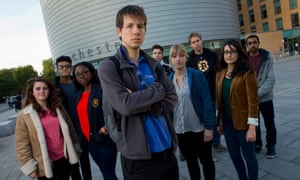
Joe Earle, centre, with the Post-Crash Economics Society at Manchester University. Photograph: Jon Super
The Econocracy makes three big arguments. First, economics has shoved its way into all aspects of our public life. Flick through any newspaper and you’ll find it is not enough for mental illness to cause suffering, or for people to enjoy paintings: both must have a specific cost or benefit to GDP. It is as if Gradgrind had set up a boutique consultancy, offering mandatory but spurious quantification for any passing cause.
Second, the economics being pushed is narrow and of recent invention. It sees the economy “as a distinct system that follows a particular, often mechanical logic” and believes this “can be managed using a scientific criteria”. It would not be recognised by Keynes or Marx or Adam Smith.
In the 1930s, economists began describing the economy as a unitary entity. For decades, Treasury officials produced forecasts in English. That changed only in 1961, when they moved to formal equations and reams of numbers. By the end of the 1970s, 99 organisations were generating projections for the UK economy. Forecasting had become a numerical alchemy: turning base human assumptions and frailty into the marketable gold of rigorous-seeming science.
By making their discipline all-pervasive, and pretending it is the physics of social science, economists have turned much of our democracy into a no-go zone for the public. This is the authors’ ultimate charge: “We live in a nation divided between a minority who feel they own the language of economics and a majority who don’t.”
This status quo works well for the powerful and wealthy and it will be fiercely defended. As Ed Miliband and Jeremy Corbyn have found, suggest policies that challenge the narrow orthodoxy and you will be branded an economic illiterate – even if they add up. Academics who follow different schools of economic thought are often exiled from the big faculties and journals.
The most devastating evidence in this book concerns what goes into making an economist. The authors analysed 174 economics modules for seven Russell Group universities, making this the most comprehensive curriculum review I know of. Focusing on the exams that undergraduates were asked to prepare for, they found a heavy reliance on multiple choice. The vast bulk of the questions asked students either to describe a model or theory, or to show how economic events could be explained by them. Rarely were they asked to assess the models themselves. In essence, they were being tested on whether they had memorised the catechism and could recite it under invigilation.
Critical thinking is not necessary to win a top economics degree. Of the core economics papers, only 8% of marks awarded asked for any critical evaluation or independent judgment. At one university, the authors write, 97% of all compulsory modules “entailed no form of critical or independent thinking whatsoever”.
The high priests of economics still hold power, but they no longer have legitimacy
Remember that these students shell out £9,000 a year for what is an elevated form of rote learning. Remember, too, that some of these graduates will go on to work in the City, handle multimillion pound budgets at FTSE businesses, head Whitehall departments, and set policy for the rest of us. Yet, as the authors write: “The people who are entrusted to run our economy are in almost no way taught to think about it critically.”
They aren’t the only ones worried. Soon after Earle and co started at university, the Bank of England held a day-long conference titled Are Economics Graduates Fit for Purpose?. Interviewing Andy Haldane, chief economist at the Bank of England, in 2014, I asked: what was the answer? There was an audible gulp, and a pause that lasted most of a minute. Finally, an answer limped out: “Not yet.”
The Manchester undergraduates were told by an academic that alternative approaches were as much use as a tobacco-smoke enema. Which is to say, he was as likely to take Friedrich Hayek or Joseph Schumpeter seriously as he was to blow smoke up someone’s arse.
The students’ entrepreneurialism is evident in this book. Packed with original research, it comes with pages of endorsements, evidently harvested by the students themselves, from Vince Cable to Noam Chomsky. Yet the text is rarely angry. Its tone is of a strained politeness, as if the authors were talking politics with a putative father-in-law.
More thoughtful academics have accepted the need for change – but strictly on their own terms, within the limits only they decide. That professional defensiveness has done them no favours. When Michael Gove compared economists to the scientists who worked for Nazi Germany and declared the “people of this country have had enough of experts”, he was shamelessly courting a certain type of Brexiter. But that he felt able to say it at all says a lot about how low the standing of economists has sunk.
The high priests of economics still hold power, but they no longer have legitimacy. In proving so resistant to serious reform, they have sent the message to a sceptical public that they are unreformable. Which makes The Econocracy a case study for the question we should all be asking since the crash: how, after all that, have the elites – in Westminster, in the City, in economics – stayed in charge?
In the autumn of 2011, as the world’s financial system lurched from crash to crisis, the authors of this book began, as undergraduates, to study economics. While their lectures took place at the University of Manchester the eurozone was in flames. The students’ first term would last longer than the Greek government. Banks across the west were still on life support. And David Cameron was imposing on Britons year on year of swingeing spending cuts.
Yet the bushfires those teenagers saw raging each night on the news got barely a mention in the seminars they sat through, they say: the biggest economic catastrophe of our times “wasn’t mentioned in our lectures and what we were learning didn’t seem to have any relevance to understanding it”, they write in The Econocracy. “We were memorising and regurgitating abstract economic models for multiple-choice exams.”
Part of this book describes what happened next: how the economic crisis turned into a crisis of economics. It deserves a good account, since the activities of these Manchester students rank among the most startling protest movements of the decade.
After a year of being force-fed irrelevancies, say the students, they formed the Post-Crash Economics Society, with a sympathetic lecturer giving them evening classes on the events and perspectives they weren’t being taught. They lobbied teachers for new modules, and when that didn’t work, they mobilised hundreds of undergraduates to express their disappointment in the influential National Student Survey. The economics department ended up with the lowest score of any at the university: the professors had been told by their pupils that they could do better.
The protests spread to other economics faculties – in Glasgow, Istanbul, Kolkata. Working at speed, students around the world published a joint letter to their professors calling for nothing less than a reformation of their discipline.
Economics has been challenged by would-be reformers before, but never on this scale. What made the difference was the crash of 2008. Students could now argue that their lecturers hadn’t called the biggest economic event of their lifetimes – so their commandments weren’t worth the stone they were carved on. They could also point to the way in which the economic model in the real world was broken and ask why the models they were using had barely changed.
The protests found an attentive audience among fellow undergraduates – the sort who in previous years would have kept their heads down and waited for the “milk round” to deliver an accountancy traineeship, but were now facing the prospect of hiring freezes, moving back home and paying off their giant student debt with poor wages.
I covered this uprising from the outset, and later served as an unpaid trustee for the network now called Rethinking Economics. To me, it has two key features in common with other social movements that sprang up in the aftermath of the banking crash. Like the Occupy protests, it was ultimately about democracy: who gets to have a say, and who gets silenced. It also shared with the student fees protests of 2010 deep discomfort at the state of modern British universities. What are supposed to be forums for speculative thought more often resemble costly finishing schools for the sons of Chinese communist party cadres and the daughters of wealthy Russians.
Much of the post-crash dissent has disintegrated into trace elements. A line can be drawn from Occupy to Bernie Sanders and Black Lives Matter; some of those undergraduates who were kettled by the police in 2010 are now signed-up Corbynistas. But the economics movement remains remarkably intact. Rethinking Economics has grown to 43 student campaigns across 15 countries, from America to China. Some of its alumni went into the civil service, where they have established an Exploring Economics network to push for alternative approaches to economics in policy making. There are evening classes, and then there is this book, which formalises and expands the case first made five years ago.
Part of this book describes what happened next: how the economic crisis turned into a crisis of economics. It deserves a good account, since the activities of these Manchester students rank among the most startling protest movements of the decade.
After a year of being force-fed irrelevancies, say the students, they formed the Post-Crash Economics Society, with a sympathetic lecturer giving them evening classes on the events and perspectives they weren’t being taught. They lobbied teachers for new modules, and when that didn’t work, they mobilised hundreds of undergraduates to express their disappointment in the influential National Student Survey. The economics department ended up with the lowest score of any at the university: the professors had been told by their pupils that they could do better.
The protests spread to other economics faculties – in Glasgow, Istanbul, Kolkata. Working at speed, students around the world published a joint letter to their professors calling for nothing less than a reformation of their discipline.
Economics has been challenged by would-be reformers before, but never on this scale. What made the difference was the crash of 2008. Students could now argue that their lecturers hadn’t called the biggest economic event of their lifetimes – so their commandments weren’t worth the stone they were carved on. They could also point to the way in which the economic model in the real world was broken and ask why the models they were using had barely changed.
The protests found an attentive audience among fellow undergraduates – the sort who in previous years would have kept their heads down and waited for the “milk round” to deliver an accountancy traineeship, but were now facing the prospect of hiring freezes, moving back home and paying off their giant student debt with poor wages.
I covered this uprising from the outset, and later served as an unpaid trustee for the network now called Rethinking Economics. To me, it has two key features in common with other social movements that sprang up in the aftermath of the banking crash. Like the Occupy protests, it was ultimately about democracy: who gets to have a say, and who gets silenced. It also shared with the student fees protests of 2010 deep discomfort at the state of modern British universities. What are supposed to be forums for speculative thought more often resemble costly finishing schools for the sons of Chinese communist party cadres and the daughters of wealthy Russians.
Much of the post-crash dissent has disintegrated into trace elements. A line can be drawn from Occupy to Bernie Sanders and Black Lives Matter; some of those undergraduates who were kettled by the police in 2010 are now signed-up Corbynistas. But the economics movement remains remarkably intact. Rethinking Economics has grown to 43 student campaigns across 15 countries, from America to China. Some of its alumni went into the civil service, where they have established an Exploring Economics network to push for alternative approaches to economics in policy making. There are evening classes, and then there is this book, which formalises and expands the case first made five years ago.

Joe Earle, centre, with the Post-Crash Economics Society at Manchester University. Photograph: Jon Super
The Econocracy makes three big arguments. First, economics has shoved its way into all aspects of our public life. Flick through any newspaper and you’ll find it is not enough for mental illness to cause suffering, or for people to enjoy paintings: both must have a specific cost or benefit to GDP. It is as if Gradgrind had set up a boutique consultancy, offering mandatory but spurious quantification for any passing cause.
Second, the economics being pushed is narrow and of recent invention. It sees the economy “as a distinct system that follows a particular, often mechanical logic” and believes this “can be managed using a scientific criteria”. It would not be recognised by Keynes or Marx or Adam Smith.
In the 1930s, economists began describing the economy as a unitary entity. For decades, Treasury officials produced forecasts in English. That changed only in 1961, when they moved to formal equations and reams of numbers. By the end of the 1970s, 99 organisations were generating projections for the UK economy. Forecasting had become a numerical alchemy: turning base human assumptions and frailty into the marketable gold of rigorous-seeming science.
By making their discipline all-pervasive, and pretending it is the physics of social science, economists have turned much of our democracy into a no-go zone for the public. This is the authors’ ultimate charge: “We live in a nation divided between a minority who feel they own the language of economics and a majority who don’t.”
This status quo works well for the powerful and wealthy and it will be fiercely defended. As Ed Miliband and Jeremy Corbyn have found, suggest policies that challenge the narrow orthodoxy and you will be branded an economic illiterate – even if they add up. Academics who follow different schools of economic thought are often exiled from the big faculties and journals.
The most devastating evidence in this book concerns what goes into making an economist. The authors analysed 174 economics modules for seven Russell Group universities, making this the most comprehensive curriculum review I know of. Focusing on the exams that undergraduates were asked to prepare for, they found a heavy reliance on multiple choice. The vast bulk of the questions asked students either to describe a model or theory, or to show how economic events could be explained by them. Rarely were they asked to assess the models themselves. In essence, they were being tested on whether they had memorised the catechism and could recite it under invigilation.
Critical thinking is not necessary to win a top economics degree. Of the core economics papers, only 8% of marks awarded asked for any critical evaluation or independent judgment. At one university, the authors write, 97% of all compulsory modules “entailed no form of critical or independent thinking whatsoever”.
The high priests of economics still hold power, but they no longer have legitimacy
Remember that these students shell out £9,000 a year for what is an elevated form of rote learning. Remember, too, that some of these graduates will go on to work in the City, handle multimillion pound budgets at FTSE businesses, head Whitehall departments, and set policy for the rest of us. Yet, as the authors write: “The people who are entrusted to run our economy are in almost no way taught to think about it critically.”
They aren’t the only ones worried. Soon after Earle and co started at university, the Bank of England held a day-long conference titled Are Economics Graduates Fit for Purpose?. Interviewing Andy Haldane, chief economist at the Bank of England, in 2014, I asked: what was the answer? There was an audible gulp, and a pause that lasted most of a minute. Finally, an answer limped out: “Not yet.”
The Manchester undergraduates were told by an academic that alternative approaches were as much use as a tobacco-smoke enema. Which is to say, he was as likely to take Friedrich Hayek or Joseph Schumpeter seriously as he was to blow smoke up someone’s arse.
The students’ entrepreneurialism is evident in this book. Packed with original research, it comes with pages of endorsements, evidently harvested by the students themselves, from Vince Cable to Noam Chomsky. Yet the text is rarely angry. Its tone is of a strained politeness, as if the authors were talking politics with a putative father-in-law.
More thoughtful academics have accepted the need for change – but strictly on their own terms, within the limits only they decide. That professional defensiveness has done them no favours. When Michael Gove compared economists to the scientists who worked for Nazi Germany and declared the “people of this country have had enough of experts”, he was shamelessly courting a certain type of Brexiter. But that he felt able to say it at all says a lot about how low the standing of economists has sunk.
The high priests of economics still hold power, but they no longer have legitimacy. In proving so resistant to serious reform, they have sent the message to a sceptical public that they are unreformable. Which makes The Econocracy a case study for the question we should all be asking since the crash: how, after all that, have the elites – in Westminster, in the City, in economics – stayed in charge?
The Econocracy is published by Manchester University.
Saturday, 10 May 2014
University economics teaching isn't an education: it's a £9,000 lobotomy
Economics took a battering after the financial crisis, but faculties are refusing to teach alternative views. It's as if there's only one way to run an economy
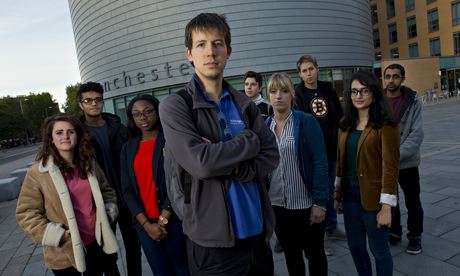
The Post-Crash Economics Society at Manchester University has arranged an evening class on bubbles, panics and crashes. Photograph: Jon Super for the Guardian
"I don't care who writes a nation's laws – or crafts its treatises – if I can write its economics textbooks," said Paul Samuelson. The Nobel prizewinner grasped that what was true of gadgets was also true for economies: he who produces the instruction manual defines how the object will be used, and to what ends.
Samuelson's axiom held good until the collapse of Lehman Brothers, which triggered both an economic crisis and a crisis in economics. In the six years since, the reputations of those high priests of capitalism, academic economists, have taken a battering.
The Queen herself asked why hardly any of them saw the crash coming, while the Bank of England's Andy Haldane has noted how it rendered his colleagues' enchantingly neat models as good as useless: "The economy in crisis behaved more like slime descending a warehouse wall than Newton's pendulum." And this week, economics students from Kolkata to Manchester have gone on the warpath demanding radical changes in what they're taught.
In a manifesto signed by 42 university economics associations from 19 countries, the students decry a "dramatic narrowing of the curriculum" that presents the economy "in a vacuum". The result is that the generation next in line to run our economy, from Whitehall departments or corporate corner-offices, discuss policy without touching on "broader social impacts and moral implications of economic decisions".
The problem is summed up by one of the manifesto's coordinators, Faheem Rokadiya, at the University of Glasgow: "Whenever I sit an economics exam, I have to turn myself into a robot." But he and his fellow reformers aren't seeking to skimp on algebra, or calling for a bonfire of the works of the Chicago school. They simply object to the notion that there is one true way to do economics, especially after that apparently scientific method has been found so badly wanting.
In their battle to open up economics, Rokadiya et al have one hell of a fight on their hands, for the same reason that it has proved so hard to democratise so many aspects of the post-crash order: the forces of conservatism are just too powerful. To see how fiercely the academics fight back, take a look at the University of Manchester.
Since last autumn, members of the university's Post-Crash Economics Society have been campaigning for reform of their narrow syllabus. They've put on their own lectures from non-mainstream, heterodox economists, even organising evening classes on bubbles, panics and crashes. You might think academics would be delighted to see such undergraduate engagement, or that economists would be swift to respond to the market.
Not a bit of it. Manchester's economics faculty recently announced that it wouldn't renew the contract of the temporary lecturer of the bubbles course, and that students who wanted to learn about the crash would have to go to the business school.
The most significant economics event of our lifetime isn't being taught in any depth at one of the largest economics faculties in the country. So what exactly is a Russell Group university teaching our future economists? Last month the Post-Crash members published a report on the deficiencies of the teaching they receive. It is thorough and thoughtful, and reports: "Tutorials consist of copying problem sets off the board rather than discussing economic ideas, and 18 out of 48 modules have 50% or more marks given by multiple choice." Students point out that they are trained to digest economic theory and regurgitate it in exams, but never to question the assumptions that underpin it. This isn't an education: it's a nine-grand lobotomy.
The Manchester example is part of a much broader trend in which non-mainstream economists have been evicted from economics faculties and now hole up in geography departments or business schools. "Intellectual talibanisation" is how one renowned economist describes it in private. This isn't just bad for academia: the logical extension of the argument that you can only study economics in one way is that you can only run the economy in one way.
Mainstream economics still has debates, but they tend to be technical in nature. The Nobel prizewinner Paul Krugman has pointed to the recent work of Thomas Piketty as proof that mainstream economics is plenty wide-ranging enough. Yet when Piketty visited the Guardian last week, he complained that economists generate "sophisticated models with very little or no empirical basis … there's a lot of ideology and self-interest".
Like so many other parts of the post-crash order, mainstream economists are liberal in theory but can be authoritarian in practice. The reason for that is brilliantly summed up by that non-economist Upton Sinclair: "It is difficult to get a man to understand something when his salary depends on his not understanding it."
Monday, 11 November 2013
Economics lecturers accused of clinging to pre-crash fallacies
Academic says courses changed little since 2008 and students taught 'theories now known to be untrue'
- Phillip Inman, economics correspondent
- The Guardian,
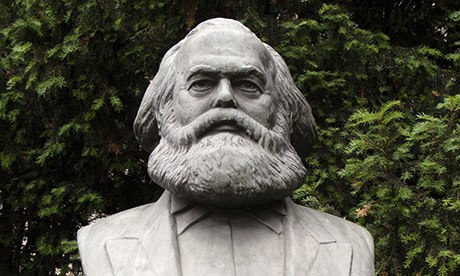
Economics departments have been accused of ignoring critics of the free market such as Karl Marx. Photograph: Alamy
Economics teaching at Britain's universities has come under fire from a leading academic who accused lecturers of presenting "things that are known to be untrue" to preserve theories that claim to show how the economy works.
The Treasury is hosting a conference in London on Monday to discuss the crisis in economics teaching, which critics say has remained largely unchanged since the 2008 financial crash despite the failure of many in the profession to spot the looming credit crunch and worst recession for 100 years.
Michael Joffe, professor of economics at Imperial College, London, said he was disturbed by the way economics textbooks continued to discuss concepts and models as facts when they were debunked decades ago.
He said: "What if economics was based more on empirical studies and empirical evidence? There are lots of studies and economists are often very good at finding the evidence for how things work, but it does not feed into or challenge what's in the textbooks.
"I asked a textbook author recently why a theory that is known to be wrong is still appearing in his book he said to me that his publisher would expect it to be there."
Joffe, a former biologist, called for more evidence in economic teaching in the October edition of the Royal Economic Society newsletter. He said many reformers had called for economics courses to embrace the teachings of Marx and Keynes to undermine the dominance of neoclassical free-market theories, but the aim should be to provide students with analysis based on the way the world works, not the way theories argue it ought to work.
"There is a lot that is taught on economics courses that bears little relation to the way things work in the real world," he said.
The Treasury-hosted conference will debate the state of economics teaching, with leading figures from the profession invited to speak, including Bank of England director Andy Haldane. Sponsored by the Institute for New Economic Thinking (INET), it aims to highlight reforms to address the shortcomings of the core economics curriculum.
Headed by economics professor Eric Beinhocker of Oxford University, the INET has grown into a large international lobby group with the aim of reforming mainstream economic teaching in the world's leading colleges.
The conference comes only a fortnight after Manchester University economics students criticised orthodox free-market teaching on their course, arguing that alternative ways of thinking have been pushed to the margins.
Members of the Post-Crash Economics Society said their course was dominated by models and equations that trained undergraduates for City jobs without a broader understanding of the way economies and businesses work.
Joe Earle, a spokesman for the society and a final-year undergraduate, said academic departments were ignoring the crisis in the profession and that, by neglecting global developments and critics of the free market such as Keynes and Marx, the study of economics was "in danger of losing its broader relevance".
The profession has been criticised for its adherence to models of a free market that claim to show demand and supply continually rebalancing over relatively short periods of time – in contrast to the decade-long mismatches that came ahead of the banking crash in key markets such as housing and exotic derivatives, where asset bubbles ballooned.
Joffe said university economics department were continuing to teach concepts that had been disproved. In one example he said the idea that companies suffer "dis-economies of scale" when they increase production beyond certain capacity was true in only a small number of firms.
The U-shaped curve shows that unit costs are high when production begins and become cheaper as economies of scale allow a company to spread costs over more units. Units become more expensive to produce after a factory reaches capacity.
Joffe said: "We ought to stop teaching the U shape as the typical relationship between costs and scale, for the simple reason that it is false."
Friday, 25 October 2013
Economics students aim to tear up free-market syllabus
Undergraduates at Manchester University propose overhaul of orthodox teachings to embrace alternative theories
- Phillip Inman, economics correspondent
- The Guardian,
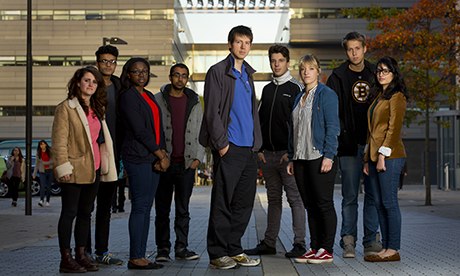
The Post-Crash Economics Society at Manchester University. Photograph: Jon Super for the Guardian
Few mainstream economists predicted the global financial crash of 2008 and academics have been accused of acting as cheerleaders for the often labyrinthine financial models behind the crisis. Now a growing band of university students are plotting a quiet revolution against orthodox free-market teaching, arguing that alternative ways of thinking have been pushed to the margins.
Economics undergraduates at the University of Manchester have formed the Post-Crash Economics Society, which they hope will be copied by universities across the country. The organisers criticise university courses for doing little to explain why economists failed to warn about the global financial crisis and for having too heavy a focus on training students for City jobs.
A growing number of top economists, such as Ha-Joon Chang, who teaches economics at Cambridge University, are backing the students.
Next month the society plans to publish a manifesto proposing sweeping reforms to the University of Manchester's curriculum, with the hope that other institutions will follow suit.
Joe Earle, a spokesman for the Post-Crash Economics Society and a final-year undergraduate, said academic departments were "ignoring the crisis" and that, by neglecting global developments and critics of the free market such as Keynes and Marx, the study of economics was "in danger of losing its broader relevance".
Chang, who is a reader in the political economy of development at Cambridge, said he agreed with the society's premise. The teaching of economics was increasingly confined to arcane mathematical models, he said. "Students are not even prepared for the commercial world. Few [students] know what is going on in China and how it influences the global economic situation. Even worse, I've met American students who have never heard of Keynes."
In June a network of young economics students, thinkers and writers set up Rethinking Economics, a campaign group to challenge what they say is the predominant narrative in the subject.
Earle said students across Britain were being taught neoclassical economics "as if it was the only theory".
He said: "It is given such a dominant position in our modules that many students aren't even aware that there are other distinct theories out there that question the assumptions, methodologies and conclusions of the economics we are taught."
Multiple-choice and maths questions dominate the first two years of economics degrees, which Earle said meant most students stayed away from modules that required reading and essay-writing, such as history of economic thought. "They think they just don't have the skills required for those sorts of modules and they don't want to jeopardise their degree," he said. "As a consequence, economics students never develop the faculties necessary to critically question, evaluate and compare economic theories, and enter the working world with a false belief about what economics is and a knowledge base limited to neoclassical theory."
In the decade before the 2008 crash, many economists dismissed warnings that property and stock markets were overvalued. They argued that markets were correctly pricing shares, property and exotic derivatives in line with economic models of behaviour. It was only when the US sub-prime mortgage market unravelled that banks realised a collective failure to spot the bubble had wrecked their finances.
In his 2010 documentary Inside Job, Charles Ferguson highlighted how US academics had produced hundreds of reports in support of the types of high-risk trading and debt-fuelled consumption that triggered the crash.
Some leading economists have criticised university economics teaching, among them Paul Krugman, a Nobel prize winner and professor at Princeton university who has attacked the complacency of economics education in the US.
In an article for the New York Times in 2009, Krugman wrote: "As I see it, the economics profession went astray because economists, as a group, mistook beauty, clad in impressive-looking mathematics, for truth."
Adam Posen, head of the Washington-based thinktank the Peterson Institute, said universities ignore empirical evidence that contradicts mainstream theories in favour of "overly technical nonsense".
City economists attacked Joseph Stiglitz, the former World Bank chief economist, and Olivier Blanchard, the current International Monetary Fund chief economist, when they criticised western governments for cutting investment in the wake of the crash.
A Manchester University spokeman said that, as at other university courses around the world, economics teaching at Manchester "focuses on mainstream approaches, reflecting the current state of the discipline". He added: "It is also important for students' career prospects that they have an effective grounding in the core elements of the subject.
"Many students at Manchester study economics in an interdisciplinary context alongside other social sciences, especially philosophy, politics and sociology. Such students gain knowledge of different kinds of approaches to examining social phenomena … many modules taught by the department centre on the use of quantitative techniques. These could just as easily be deployed in mainstream or non-mainstream contexts."
Thursday, 26 September 2013
Is PPE a passport to power – or the ultimate blagger's degree?
Ed Miliband, Ed Balls and David Cameron all studied philosophy, politics and economics at Oxford. What does the degree really teach you and why is it the perfect springboard to a career in Westminster and the media?
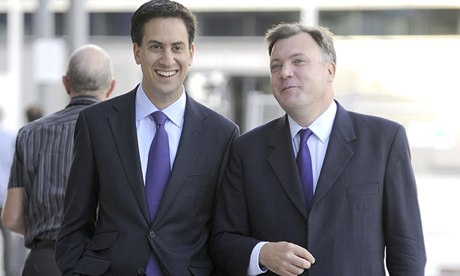
Ed Miliband and Ed Balls. Photograph: Stephen Simpson/Rex Features
On their own, they aren't particularly remarkable. Taken together at York or Warwick, they still aren't anything very remarkable. But study philosophy, politics and economics(PPE) at Oxford University and you get power and influence thrown in with your degree certificate on graduation day.
At least that's the way it looks. Of the current cabinet, David Cameron, William Hague, Jeremy Hunt and Philip Hammond all read PPE: as did Ed Miliband, Ed Balls and Danny Alexander along with about another 30 MPs. Among many others at the BBC, Nick Robinson, Stephanie Flanders, Evan Davis and Newsnight editor Ian Katz read PPE. At least eight journalists at the Guardian read PPE, with similar numbers at the other broadsheets. And tabloids, for that matter. Toby Young read PPE. Even Chris Huhne read PPE.
Some might take one look at both politics and journalism and conclude that the one thing they have in common is a talent for having a firm opinion about absolutely everything regardless and that PPE is a life lesson lesson in winging it. Others who went to Oxford certainly think that. When asked by Jeremy Paxman on Newsnight if it rankled that Cameron had got a first when he had only got a 2:1, Boris Johnson, whose degree was in classics, said: "It would if it wasn't that his first was in PPE." His message was clear: PPE was an inferior degree. Though one might also wonder at the cheek of Boris Johnson for calling Cameron out as a slacker.
Slack is certainly not the word Oxford University chooses to describe PPE; only 15% of those who apply are admitted. Rather it prefers to market the course as "Modern Greats" that "brings together some of the most important approaches to understanding the social and human world around us, developing skills useful for a whole range of future careers and activities". In the first year, students study all three subjects equally, after which they can choose to drop one.
So what sort of student chooses PPE? For some it's a chance to try something new. "I had taken science A-levels but didn't want to continue any of those subjects at university," says one graduate. "PPE seemed like a safe transition. The three branches covered a lot of ground and if I found one boring or wasn't up to it, then I could drop it." Not knowing exactly what they wanted to study was also key for many other students but there are a significant number for whom the course's reputation was critical.
"There were those who had chosen PPE precisely because it was a springboard to a career in the politics or the media," says a former student. "They had their whole lives mapped out from the moment they arrived at Oxford. They knew they were going to edit the student newspaper, be president of the union and what job they were going to end up in. They probably even knew whom they were going to marry. They seemed to have got just about everything else right."
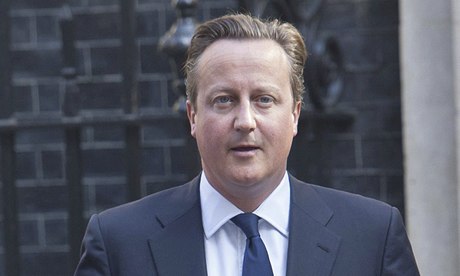 David Cameron. Photograph: Rex
David Cameron. Photograph: Rex
"It's definitely something that is commented on and joked about," says a graduate from Wadham. "There's a moment in The West Wing, a flashback I think, when one character is handed a napkin with 'Bartlett for President' written on as they plan to make him run for office. Well, I'd be lying if I said there weren't more than a few drunken nights that ended with someone being handed a napkin with 'X for Prime Minister' written on. People are fully aware, and much of the student union is made up of PPE students. That creates a pressure in its own way too – I certainly still think about it. I think most people who did it are interested in politics, and so it's natural to wonder if you could do it better – especially as you see more and more of your peers getting heavily involved."
PPE's reputation for being a bit of a doss compared with other courses stems not so much from the amount of work that is required – most students remember feeling they could never hope to cover all the reading they were given – but from the freedom they have to do it. While science students usually had to be in the lab every day from 9am till 5pm, PPE students could spend the entire morning in bed. Lectures are not compulsory: one of the graduates who spoke to me said he never went to a single one during his entire three years – "There was no real point so long as you did the reading" – and the three or four tutorials a week are usually arranged at a mutually convenient civilised hour later in the day. So, as one graduate put it: "If you wanted to lie in during the mornings and plan your conquest of Oxford in the afternoons, you could. As long as you got your essays done on time – you could write them at night, if necessary – there was nothing stopping you."
Most graduates say there were many more men in their year than women, but no one found it particularly macho. "Yes, it was competitive and students were ambitious," says a female graduate. "But you'd expect that at Oxford; the university is full of alpha types who are used to succeeding. About a third of the students may have made a point of wanting to show how clever they were by not dropping a subject, even though it gave them a great deal more work and didn't get them any extra benefit, but the bragging rights weren't worth a great deal as most students didn't know each other. There were so many different options and tutorial groups were so small, you could go through your entire Oxford career never talking to some people on the course."
Oxford's sales pitch for PPE describes the course as "a multidisciplinary degree designed for those who like to draw connections among political, economic and social phenomena". This is slightly misleading, as it implies that the course tutors go out of their way to help students make these connections and that the three disciplines have been tailored to complement one another. "Nothing could be further from the truth," says one graduate. "Each subject exists entirely in its own bubble and it's almost as if a don would rather die than talk to someone teaching one of the other subjects. Every don is convinced that theirs is the only subject worth doing and that the others are a bit of a waste of time. So you're left to make your own connections between the subjects."
Sometimes this works better than others. One graduate regrets having given up economics at the end of the first year. "It was taught in such a dull, theoretical way that I just couldn't see the point of it," she says. "It just didn't seem to relate to anything in real life. Only since I've left Oxford have I come to understand how central it is to understanding how the world operates."
But mostly it works like this. Students make the political, philosophical and economic connections they were always going to make. Those on the right have their rightwing views reinforced; those on the left have their leftwing views reinforced. All that's happened in the three years in between is that everyone has become a bit better informed and a lot more confident that they are right. And maybe it's just as much the social connections that are made that turn so many PPE graduates into masters of the universe: after all, many continue to orbit one another throughout their careers. "The thing is this," one graduate laughs, "PPE is such a big subject that no one can ever know everything, so we all have to bullshit like mad at times to cover up our ignorance. And we by and large get away with it. So we carry on bullshitting once we leave Oxford and most of us are still getting away with it."
The syllabus
Year 1
All courses studied equally.
Philosophy – general philosophy, moral philosophy and elementary logic.
Politics – theorising the democratic state and analysis of democratic institutions in the US, UK, France and Germany.
Economics – microeconomics, macroeconomics and mathematical techniques.
Years 2 and 3
Only two branches must be taken.
Philosophy – ethics and either early modern philosophy; or knowledge and reality; or Plato's Republic; or Aristotle's Nicomachean Ethics.
Politics – any two of: comparative government; British politics and government since 1900; theory of politics; international politics; political sociology.
Economics – microeconomics, macroeconomics and quantitative economics
In addition to these compulsory courses, second- and third-year students may take optional papers from a choice of more than 50 courses. Compulsory courses can also be taken as options.
Subscribe to:
Comments (Atom)
